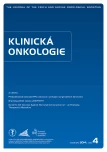-
Medical journals
- Career
Paraneoplastic Vasculitis in a Patient with Cervical Cancer
Authors: F. Kohútek 1; A. Rosík 1; N. Izák 2; M. Tamášová 3; B. Bystrický 1
Authors‘ workplace: Onkologické oddelenie, FN Trenčín, Slovensko 1; Magnetická rezonancia FUTURUM s. r. o., Trenčín, Slovensko 2; Klinika pneumológie a ftizeológie LF UK a UN Bratislava, Slovensko 3
Published in: Klin Onkol 2014; 27(4): 287-290
Category: Case Report
Overview
Background:
Paraneoplastic syndromes precede the diagnosis of malignancy. Early detection of paraneoplastic syndrome may lead to detection of malignancy in its early and potencially curable stage. Differential diagnostic process of rare paraneoplastic vasculitis requires multidisciplinar cooperation between rheumatologists, radiologists and oncologists.Case:
41‑year ‑ old female patient with cervical cancer in stage IVB (paraaortic lymphadenopathy) and clinical symptoms of acute vasculitis was admitted to our ward for oncological treatment. Chemoradiotheraphy was initiated concurently with corticotherapy. During the treatment we observed alleviation of vasculitis‑related symptoms. Ongoing follow‑up, however, brought no further improvement in vasculitis‑related symptoms. This lead us to suspiction of recurrence, confirmed on CT scan. Paliative chemotherapy was without any effect and due to worsening performance status was terminated.Conclusion:
The activity of vasculitis was closely associated with the activity of primary malignant disease. Early recognition of paraneoplastic syndrome may contribute not only to diagnosis of malignancy, but is helpfull during follow‑up of these patients.Key words:
cervical cancer – paraneoplastic syndrome – vasculitis – angiography
The authors declare they have no potential conflicts of interest concerning drugs, products, or services used in the study.
The Editorial Board declares that the manuscript met the ICMJE “uniform requirements” for biomedical papers.Submitted:
14. 6. 2014Accepted:
6. 7. 2014
Sources
1. Adam Z, Chlupová G et al. Systémové a paraneoplastické projevy maligních onemocnení. Vnitř Lék 2007; 53(3): 253 – 285.
2. Jennette JC, Falk RJ, Bacon PA et al. 2012 Revised International Chapel Hill Consensus Conference Nomenclature of Vasculitides. Arthritis Rheum 2013; 65(1): 1 – 11. doi: 10.1002/ art.37715.
3. Solans ‑ Laqué R1, Bosch ‑ Gil JA, Pérez ‑ Bocanegra C et al. Paraneoplastic vasculitis in patients with solid tumors: report of 15 cases. J Rheumatol 2008; 35(2): 294 – 304.
4. Bečvář R, Rovenský J. Sekundárne vaskulitídy pri systémových ochoreniach spojivového tkaniva a poliekové vaskulitídy. Vaskulárna medicína 2010; 2(3): 120 – 126.
5. Mukhtyar C, Guillevin L, Cid MC et al. EULAR recommendations for the management of primary small and medium vessel vasculitis. Ann Rheum Dis 2009; 68(3): 310 – 317. doi: 10.1136/ ard.2008.088096.
6. NCCN.org [homepage on the Internet]. Clinical practice guidelines in oncology: cervical cancer. National Comprehensive Cancer Network; 2013 [cited 2013 Nov 1]. Available from: http:/ / www.nccn.org/ professionals/ physician_gls/ pdf/ cervical.pdf.
Labels
Paediatric clinical oncology Surgery Clinical oncology
Article was published inClinical Oncology

2014 Issue 4-
All articles in this issue
- Paraneoplastic Vasculitis in a Patient with Cervical Cancer
- Acupuncture in the Treatment of Symptoms of Oncological Diseases in the Western World
- Dendritic Cell Vaccines Against Non‑ small Cell Lung Cancer – an Emerging Therapeutic Alternative
- Pacient s Cowdenovým syndromem způsobeným mutací v genu PTEN (archiv 2. LF UK a FN v Motole)
- Anticipated Efficacy of HPV Vaccination in Prophylaxis Against Nongenital Cancers
- The Cost Study of First- line Treatment of Metastatic Colorectal Carcinoma with Bevacizumab- containing Regimen in the Czech Republic
- Screening of Malnutrition Risk Versus Indicators of Nutritional Status and Systemic Inflammatory Response in Newly Diagnosed Lung Cancer Patients
- Relation between Carbonic Anhydrase IX Serum Level, Hypoxia and Radiation Resistance of Head and Neck Cancers
- Brazilian Story of the R337H p53 Mutation
- Impact of Anakinra Treatment on Cytokine and Lymphocytes/ Monocytes Profile of an Erdheim-Chester Patient
- Positron Emission Tomography Combined with Computed Tomography for Diagnosis of Synchronous Tumors
- Clinical Oncology
- Journal archive
- Current issue
- Online only
- About the journal
Most read in this issue- Brazilian Story of the R337H p53 Mutation
- Acupuncture in the Treatment of Symptoms of Oncological Diseases in the Western World
- Paraneoplastic Vasculitis in a Patient with Cervical Cancer
- Screening of Malnutrition Risk Versus Indicators of Nutritional Status and Systemic Inflammatory Response in Newly Diagnosed Lung Cancer Patients
Login#ADS_BOTTOM_SCRIPTS#Forgotten passwordEnter the email address that you registered with. We will send you instructions on how to set a new password.
- Career

